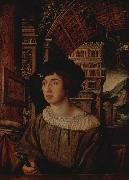Wholesale Oil Painting No Minimum |
|||||||||||
|
|
|||||||||||

|
|||||||||||
|
|
|
||||||||
Ambrosius Holbein1494-1519 German Ambrosius Holbein Gallery Ambrosius Holbein (c. 1494 ?C c. 1519) was a German and Swiss artist in painting, drawing and printmaking. He was the elder brother, by about three years, of Hans Holbein the Younger and like his brother was born in Augsburg (which today is in Bavaria, but then was a free imperial city), a center of art, culture and trade at that time. His father Hans Holbein the Elder was a pioneer and leader in the transformation of German art from the Gothic to the Renaissance style. In his studio both his sons, Ambrosius and Hans, received their first painting lessons as well as the an introduction to the crafts of the goldsmith, jeweller and printmaker. Portrait of a Boy with Blond Hair, 1516, BaselIn 1515 Ambrosius lived in the Swiss town of Stein am Rhein, where he helped a Schaffhausen painter named Thomas Schmid with the murals in the main hall of the St George monastery. The next year saw Ambrosius, as well as his brother Hans, in Basel, where he initially worked as a journeyman in Hans Herbster??s studio. In 1517 he was enrolled in a register of the Basel painters' guild and in 1518 he was naturalized as a citizen there. The Portrait of a Boy with Blond Hair and its companion, the Portrait of a Boy with Brown Hair, are among Ambrosius?? best works of this period. Both are nowadays in the Basel Kunstmuseum. Ambrosius Holbein ranks among the most important of Basel??s illustrators and prominent „small formats?? artists. |
||||||||
|
|
||||||||
Portrait of a Young Man,
Portrait of a Young Man, Painting ID:: 59392 |
Portrait of a Young Man, 1518, oil on wood, 43 x 32 cm, Hermitage Museum, St Petersburg Portrait of a Young Man, 1518, oil on wood, 43 x 32 cm, Hermitage Museum, St Petersburg |
|||||||
|
|
||||||||
|
Correggio Italian 1489-1534 Correggio Locations Italian painter and draughtsman. Apart from his Venetian contemporaries, he was the most important northern Italian painter of the first half of the 16th century. His best-known works are the illusionistic frescoes in the domes of S Giovanni Evangelista and the cathedral in Parma, where he worked from 1520 to 1530. The combination of technical virtuosity and dramatic excitement in these works ensured their importance for later generations of artists. His altarpieces of the same period are equally original and ally intimacy of feeling with an ecstatic quality that seems to anticipate the Baroque. In his paintings of mythological subjects, especially those executed after his return to Correggio around 1530, he created images whose sensuality and abandon have been seen as foreshadowing the Rococo. Vasari wrote that Correggio was timid and virtuous, that family responsibilities made him miserly and that he died from a fever after walking in the sun. He left no letters and, apart from Vasari account, nothing is known of his character or personality beyond what can be deduced from his works. The story that he owned a manuscript of Bonaventura Berlinghieri Geographia, as well as his use of a latinized form of Allegri (Laetus), and his naming of his son after the humanist Pomponius Laetus, all suggest that he was an educated man by the standards of painters in this period. The intelligence of his paintings supports this claim. Relatively unknown in his lifetime, Correggio was to have an enormous posthumous reputation. He was revered by Federico Barocci and the Carracci, and throughout the 17th and 18th centuries his reputation rivalled that of Raphael. Portrait of a Young Man, Correggio: Portrait of a Young Man, c. 1525, oil on wood, 59 x 44 cm (23 1/4 x 17 1/4 in.), Musee du Louvre, Paris ca. 1525(1525) cjr |
||||||||
|
|
||||||||
|
Prev Next
|
||||||||
|
|
||||||||
|
Related Paintings to Correggio :. |
||||||||
|
|
||||||||
|
CONTACT US |

